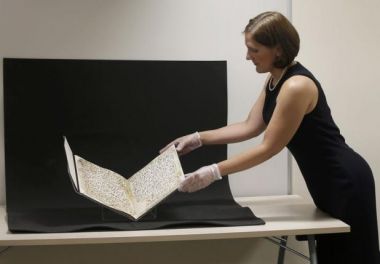Ancient fragments in UK library raise doubts on how, when Quran was written

For almost a century, an ancient manuscript has been sitting idly at the library of the University of Birmingham in West Midlands, UK.
Researchers recently found out that this manuscript is one of the oldest fragments of the Islamic Scripture, the Quran—a discovery that can have serious implications on the Muslim faith as a whole.
The fragments, which radiocarbon dating found to be at least 1,370 years old, predated Prophet Muhammad, whom Muslims believe to have founded Islam and have written the Quran.
The parchment was believed to have existed between 568 and 645 B.C. Islamic teachings, however, say the Prophet Muhammad received the revelations that form the Quran between the years 610 and 632, the year of his death.
Keith Small of Oxford's Bodleian Library explained that radiocarbon dating established how the Quran already existed even before Muhammad. He believes the Muslim prophet just altered the document.
"This gives more ground to what have been peripheral views of the Quran's genesis, like that Muhammad and his early followers used a text that was already in existence and shaped it to fit their own political and theological agenda, rather than Muhammad receiving a revelation from heaven," Small explained.
Historian Tom Holland, meanwhile, said the discovery of this ancient Quran fragments—which were written down on parchment, stone, palm leaves and the shoulder blades of camels—can really shake up the Islamic faith.
"It destabilises, to put it mildly, the idea that we can know anything with certainty about how the (Quran) emerged—and that in turn has implications for the history of Muhammad and the Companions," Holland said.
For University of Birmingham Professor David Thomas, who teaches Christianity and Islam, the new discovery may mean that the writer of the Quran could have documented what Muhammad preached.
"The person who actually wrote it could well have known the Prophet Muhammad. He would have seen him probably, he would maybe have heard him preach. He may have known him personally—and that really is quite a thought to conjure with," Thomas said.











